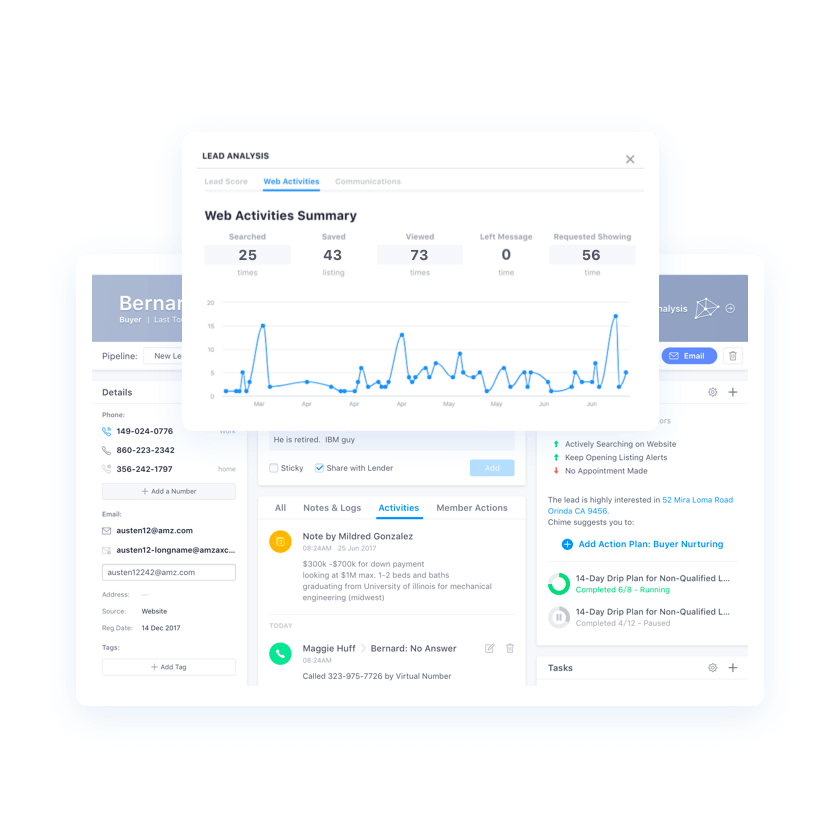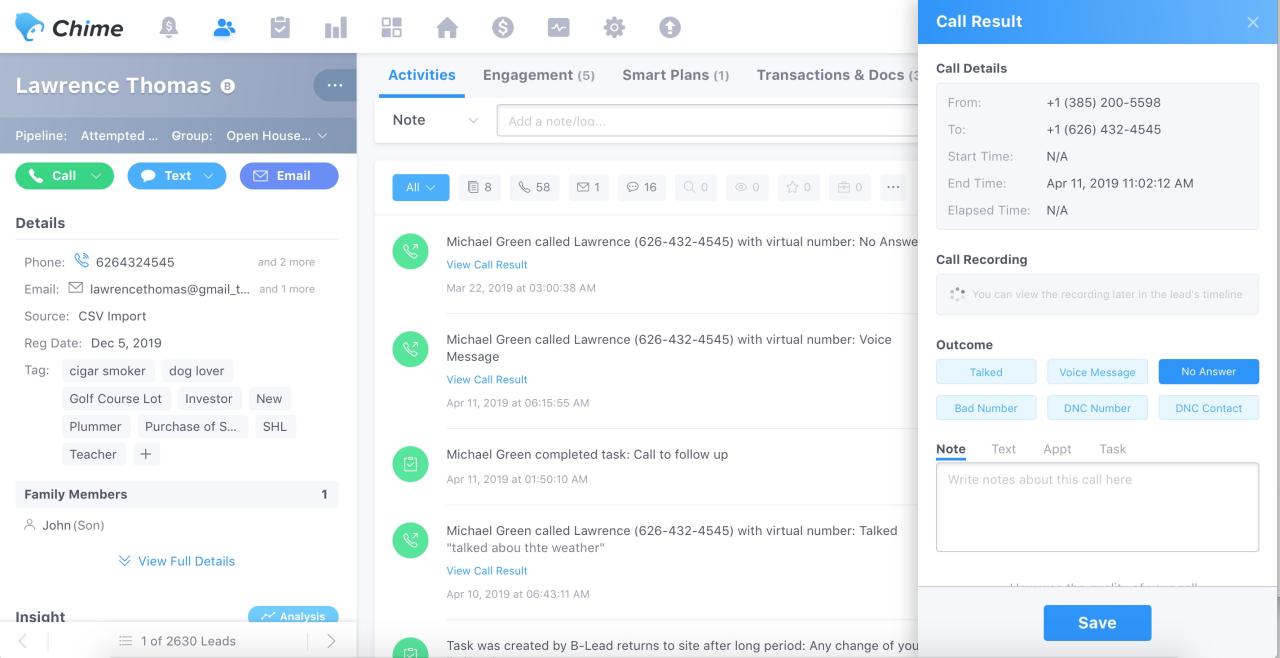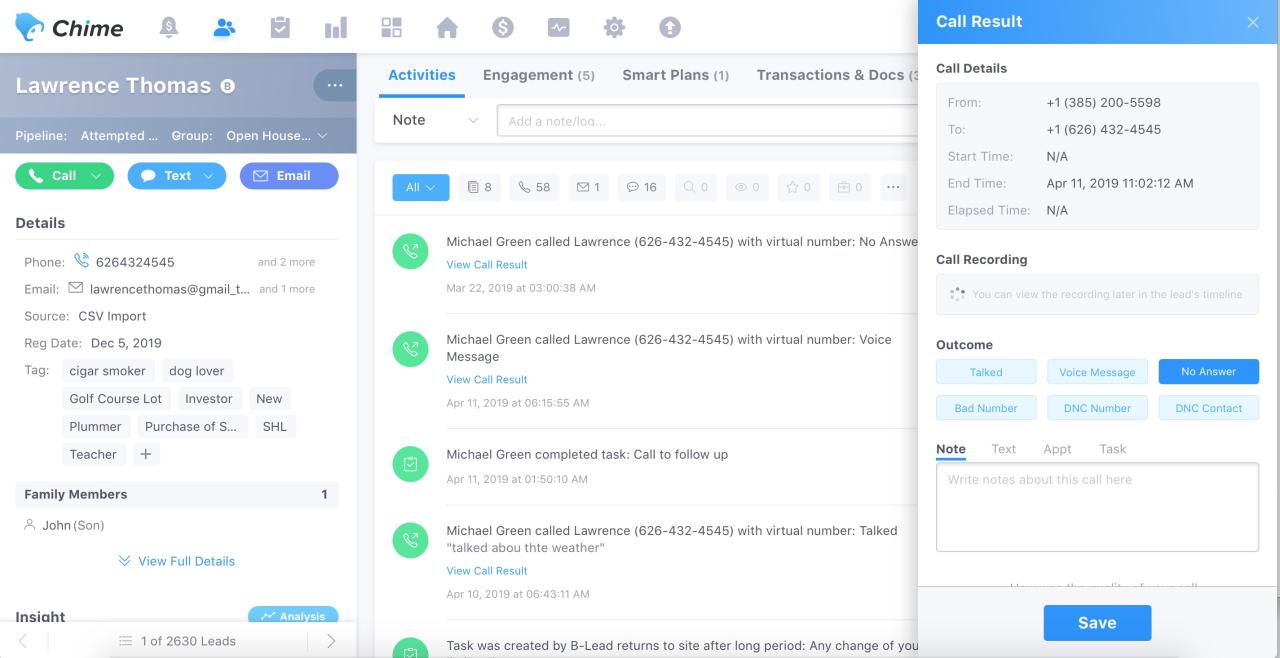ChimeCRM is a powerful platform designed to streamline business operations and enhance customer interactions. It’s built for modern businesses seeking efficient solutions for sales, marketing, and customer service. This overview will explore the core functionalities, target audience, key features, and more.
From small startups to large enterprises, ChimeCRM offers customizable tools that adapt to diverse business needs. The platform’s intuitive design prioritizes user experience, ensuring a smooth workflow for all users. Its modular structure allows for targeted solutions, whether focused on sales automation or customer support.
Introduction to ChimeCRM

ChimeCRM is a comprehensive Customer Relationship Management (CRM) solution designed to streamline business operations and enhance customer interactions. It offers a suite of tools for managing contacts, tracking sales opportunities, and automating marketing campaigns. This allows businesses to improve customer engagement, increase sales, and ultimately, drive growth.ChimeCRM is specifically tailored for businesses seeking a user-friendly and adaptable CRM platform.
Its intuitive interface and customizable features empower businesses to manage their entire sales pipeline and customer journey effectively.
Core Functionalities of ChimeCRM
ChimeCRM’s core functionalities encompass a wide range of tools designed to optimize sales, marketing, and customer service efforts. These functionalities include contact management, lead nurturing, sales pipeline tracking, and comprehensive reporting. The platform facilitates seamless communication and collaboration across teams, enabling efficient data sharing and improved decision-making.
Target Audience for ChimeCRM
ChimeCRM caters to a diverse range of businesses, from small startups to established enterprises. Its flexible architecture and scalable features ensure that it can adapt to the evolving needs of businesses of various sizes and complexities. The platform is particularly suitable for companies in the service sector, retail, and e-commerce.
Types of Businesses Benefiting from ChimeCRM
ChimeCRM proves beneficial for numerous business types. For example, small businesses can leverage its affordable pricing and user-friendly interface to manage customer interactions effectively. Medium-sized enterprises can use ChimeCRM to streamline their sales processes, track key performance indicators (KPIs), and gain valuable insights into customer behavior. Large enterprises can benefit from the platform’s robust features to centralize data, automate workflows, and improve collaboration among teams.
ChimeCRM supports various industries, including retail, hospitality, and technology.
Key Features and Benefits of ChimeCRM
ChimeCRM provides a range of user-friendly features, contributing to an exceptional user experience. Key features include a customizable dashboard for monitoring key performance indicators, intuitive drag-and-drop functionalities for streamlining workflows, and automated email sequences for nurturing leads and prospects. These features, coupled with the platform’s mobile accessibility, empower users to manage their business on the go, fostering enhanced productivity and responsiveness.
Comparison of ChimeCRM with Similar CRM Solutions
| Feature | ChimeCRM | Salesforce | Zoho CRM |
|---|---|---|---|
| Ease of Use | Intuitive interface, drag-and-drop functionality | Powerful but potentially complex | User-friendly interface, good for beginners |
| Pricing | Competitive pricing tiers for different business needs | Often higher price point | Affordable options available |
| Customization | High degree of customization for specific business requirements | High level of customization options | Good level of customization |
| Reporting & Analytics | Comprehensive reporting dashboards for insightful data analysis | Extensive reporting and analytics tools | Robust reporting and analytics functionalities |
The table above provides a comparative overview of ChimeCRM against two popular CRM solutions, Salesforce and Zoho CRM. The comparison highlights the key aspects that differentiate these platforms in terms of user experience, pricing, and customization options.
Features and Capabilities
ChimeCRM offers a comprehensive suite of features designed to streamline sales processes and enhance customer relationships. Its modular design allows businesses to tailor the platform to their specific needs, whether they’re focusing on lead generation, sales management, or customer support. This flexibility, combined with robust integration capabilities, positions ChimeCRM as a powerful tool for businesses of all sizes.The platform’s intuitive interface and user-friendly navigation make it accessible to individuals with varying technical backgrounds.
This accessibility, combined with the versatility of its features, empowers users to maximize the platform’s potential and effectively manage their sales pipeline and customer interactions.
Key Differentiating Features
ChimeCRM distinguishes itself from competitors through its combination of advanced sales tools, robust customer relationship management capabilities, and seamless integration options. Features such as AI-powered lead scoring, automated email sequences, and customizable dashboards provide significant advantages in the competitive CRM market. These tools empower sales teams to prioritize high-potential leads, nurture prospects effectively, and track performance metrics with precision.
Modules Overview
ChimeCRM comprises several interconnected modules designed to address various aspects of the sales cycle and customer journey. These modules work in concert to create a comprehensive view of the customer and streamline operations across different departments.
- Sales Management Module: This module encompasses tools for managing leads, contacts, opportunities, and sales forecasts. It enables sales teams to track progress, identify bottlenecks, and improve conversion rates. Detailed reports provide insights into sales performance, enabling data-driven decisions.
- Marketing Automation Module: This module empowers businesses to automate marketing campaigns, nurture leads, and segment audiences. Personalized email sequences, targeted ads, and automated workflows optimize marketing efforts and improve lead qualification.
- Customer Support Module: This module provides tools for managing customer inquiries, resolving issues, and fostering customer loyalty. Ticketing systems, knowledge bases, and reporting tools allow support teams to respond efficiently and provide excellent service.
Integration Capabilities
ChimeCRM’s integration capabilities allow it to seamlessly connect with other essential business applications. This interoperability ensures data consistency and streamlines workflows, reducing manual data entry and improving overall efficiency.
- Integration with popular email platforms: ChimeCRM integrates with email platforms like Gmail, Outlook, and Yahoo Mail to synchronize contact information and track email interactions.
- Integration with marketing automation tools: ChimeCRM integrates with popular marketing automation tools to automate marketing campaigns, nurture leads, and track marketing ROI.
- Integration with accounting software: ChimeCRM integrates with accounting software to link sales data with financial records, ensuring accurate reporting and financial analysis.
Common Use Cases
ChimeCRM is adaptable to diverse business needs and is utilized in various industries. The following examples highlight the platform’s versatility.
- E-commerce businesses: ChimeCRM can manage customer interactions, track sales, and provide detailed reporting on sales performance, aiding in inventory management and sales forecasts.
- Real estate agencies: ChimeCRM allows real estate agents to manage client interactions, track property listings, and manage deals efficiently. This improves lead conversion and enables accurate forecasting of future deals.
- Software as a Service (SaaS) companies: ChimeCRM helps SaaS companies manage customer relationships, track sales, and provide customer support. It facilitates efficient communication with clients, leading to increased retention and sales.
Pricing Tiers
The following table Artikels the different pricing tiers offered by ChimeCRM, along with the corresponding features included in each.
| Pricing Tier | Monthly Fee | Key Features |
|---|---|---|
| Basic | $49 | Lead Management, Basic Reporting, Email Integration |
| Professional | $99 | All Basic Features + Advanced Reporting, Marketing Automation, Custom Dashboards |
| Enterprise | Custom Pricing | All Professional Features + Advanced Analytics, API Integrations, Dedicated Support |
User Experience and Interface
ChimeCRM prioritizes a seamless and intuitive user experience, designed to streamline workflows and maximize efficiency. Its interface is carefully crafted to be both aesthetically pleasing and highly functional, ensuring that users can quickly navigate and utilize its various features. This approach is crucial for fostering user adoption and maximizing the platform’s potential within an organization.The navigation of ChimeCRM is straightforward and intuitive.
Users can easily access key functionalities through a well-organized menu system, and the layout is designed to be easily adaptable to different user roles and preferences. Quick access to frequently used tools is a key element, minimizing the time required to complete tasks.
Navigation and Interface Design
The ChimeCRM interface employs a clean, modern design that facilitates rapid comprehension and interaction. A prominent navigation bar provides access to all core modules, while customizable dashboards allow users to tailor their view to prioritize relevant information. This modular approach empowers users to personalize their workspace and concentrate on specific tasks. The use of clear visual cues and intuitive icons further enhances user understanding and interaction.
The overall aesthetic is professional and user-friendly, minimizing any potential learning curve.
Onboarding New Users
A structured onboarding process guides new users through the platform’s features and functionalities. This process begins with a comprehensive tutorial, providing step-by-step instructions and examples. Detailed documentation is readily available, offering a wealth of information and resources. Training materials are designed to be easily accessible, fostering a supportive learning environment. Dedicated support channels, such as FAQs and email support, are available to address any queries or concerns promptly.
This ensures new users can swiftly integrate into the system and maximize their productivity.
Ease of Use and Intuitive Design
ChimeCRM’s design prioritizes simplicity and efficiency. The layout is logical and well-organized, minimizing the need for extensive training. The interface is responsive and adapts seamlessly to various screen sizes, ensuring consistent usability across different devices. Intuitive controls and clear labeling enhance user understanding and interaction. This focus on user-friendliness reduces the time needed to learn the system and maximize productivity.
Common Workflows
Several common workflows are streamlined within ChimeCRM. For instance, the process for managing customer interactions is optimized, allowing users to easily track communication, log activities, and manage follow-ups. Lead generation and qualification workflows are also simplified, helping teams effectively identify and nurture potential customers. Customizable templates for frequently used documents (like proposals or reports) and automated tasks enhance efficiency, allowing users to focus on core business functions.
User Roles and Access Privileges
This table Artikels the different user roles and their associated access privileges within ChimeCRM:
| User Role | Access Privileges |
|---|---|
| Administrator | Full access to all features, including system configuration, user management, and data modification. |
| Sales Representative | Access to customer data, opportunity management tools, and sales forecasting features. Limited access to system configuration. |
| Marketing Specialist | Access to marketing campaign management tools, lead generation data, and reporting features. Limited access to sales and financial data. |
| Customer Support Agent | Access to customer interaction records, support ticket management, and knowledge base resources. Limited access to financial and administrative data. |
This structured approach ensures that each user role has the necessary permissions to perform their tasks effectively, promoting organizational efficiency and data security.
Customer Support and Resources
ChimeCRM prioritizes user satisfaction and provides comprehensive support to ensure a seamless experience. This section details the various avenues available to users seeking assistance, guidance, and resources. Users can access a wealth of information, from in-depth documentation to interactive training programs and a vibrant community forum.
Support Channels
ChimeCRM offers multiple support channels to cater to diverse user needs and preferences. Users can choose the method that best suits their situation and time constraints. This flexibility ensures prompt and effective assistance.
- Email Support: Users can submit inquiries through a dedicated email address, receiving personalized responses and support from our team.
- Live Chat Support: Real-time assistance is available via live chat, enabling immediate interaction with support agents to resolve issues quickly.
- Phone Support: For more complex or urgent matters, phone support offers direct communication with our dedicated support team for personalized assistance.
- Knowledge Base: A comprehensive knowledge base provides readily accessible articles and FAQs covering a wide range of topics, enabling self-service problem resolution.
Documentation and Tutorials
A well-organized library of documentation and tutorials is readily available for ChimeCRM users. These resources offer in-depth information and practical guidance, enabling users to efficiently utilize the platform’s features.
- User Guides: Detailed user guides offer step-by-step instructions on various functionalities, covering everything from account setup to advanced reporting techniques.
- Video Tutorials: A collection of video tutorials demonstrates practical applications and showcases specific functionalities, providing visual guidance and faster comprehension.
- API Documentation: Comprehensive API documentation is available for developers and technical users, outlining the platform’s programming interface and enabling integration with other systems.
Training Programs
ChimeCRM offers various training programs to equip users with the necessary skills and knowledge to effectively utilize the platform. These programs are designed to cater to different learning styles and experience levels.
- Online Webinars: Regular webinars cover specific functionalities and best practices, providing interactive learning opportunities.
- On-site Workshops: In-person workshops provide hands-on experience with the platform, facilitated by our expert trainers, in a tailored learning environment.
- Customizable Training Sessions: ChimeCRM also offers custom training sessions tailored to the specific needs and requirements of particular organizations or groups.
Community Forums
A vibrant community forum serves as a valuable resource for users. Here, users can interact, share knowledge, and collaborate to resolve issues and learn from each other’s experiences.
- Active Discussions: The forum facilitates active discussions on a wide range of topics related to ChimeCRM usage, providing valuable insights and solutions.
- Knowledge Sharing: Users can share best practices, tips, and tricks, fostering a collaborative learning environment.
- Problem Resolution: Users can seek assistance from experienced members and benefit from collective problem-solving strategies.
Contact Information
The following table Artikels contact information for different support levels. Contact details are categorized for efficient and appropriate escalation.
| Support Level | Contact Information |
|---|---|
| Basic Support | [email protected] |
| Premium Support | [email protected] |
| Enterprise Support | [email protected] |
Market Position and Trends
ChimeCRM navigates a dynamic CRM market, characterized by constant innovation and evolving customer expectations. Understanding its position relative to emerging trends and the competitive landscape is crucial for its continued success. This section delves into ChimeCRM’s current market standing, its target segments, and how it positions itself amidst the broader CRM landscape.The CRM software market is highly competitive, with established players and numerous startups vying for market share.
This competitive environment necessitates a clear understanding of emerging features and trends to remain relevant and attractive to potential customers.
Comparison to Emerging CRM Trends
ChimeCRM embraces several key trends shaping the future of CRM. Its focus on user-friendly interfaces and intuitive navigation aligns with the growing demand for accessible and efficient CRM solutions. Moreover, ChimeCRM’s integration capabilities enable seamless data flow across various platforms, which is a crucial aspect of modern business operations.
Competitive Landscape Analysis
The CRM software market is a complex landscape, encompassing a broad range of solutions catering to diverse needs. Established players like Salesforce, Microsoft Dynamics 365, and HubSpot command significant market share, offering robust feature sets and extensive customer support. Smaller, specialized CRM providers cater to niche industries and specific business requirements. ChimeCRM differentiates itself by emphasizing affordability and accessibility while still providing substantial functionality.
Emerging Features Shaping the Future of CRMs
Several emerging features are transforming the CRM landscape. AI-powered automation for tasks like lead scoring and email campaigns is becoming increasingly common. Personalized customer experiences, driven by CRM data analysis, are crucial for driving customer engagement and loyalty. Integration with other business tools, like marketing automation platforms and e-commerce systems, allows for a holistic view of customer interactions.
ChimeCRM is actively exploring and implementing these features to provide a forward-looking and versatile solution.
Market Share Overview
Unfortunately, precise, publicly available market share data for ChimeCRM is not readily available. However, the company’s strong emphasis on user experience, affordability, and robust functionality positions it well to capture a substantial portion of the market.
Key Market Segments Targeted by ChimeCRM
ChimeCRM’s primary target market segments are small and medium-sized businesses (SMBs) across various industries. These businesses often require a balance of affordability, functionality, and user-friendliness. ChimeCRM’s design prioritizes ease of use, which directly benefits this segment. Furthermore, specific niches within the SMB market, such as startups and e-commerce businesses, are also potential targets, reflecting the company’s desire to support businesses in different stages of growth.
Case Studies and Success Stories

ChimeCRM has consistently delivered positive outcomes for businesses across various sectors. These case studies highlight the tangible benefits and demonstrate how ChimeCRM empowers businesses to streamline operations, improve customer engagement, and achieve significant growth. Each case study showcases a real-world scenario, detailing the challenges faced and how ChimeCRM’s features and capabilities provided effective solutions.
Case Study 1: E-commerce Growth with ChimeCRM
This case study focuses on a medium-sized e-commerce company struggling with fragmented customer data and inefficient sales processes. The company experienced difficulty in tracking customer interactions across various platforms, leading to lost sales opportunities and a decline in customer retention.
- Challenges Before Adoption: Poor customer segmentation, lack of real-time data insights, and inefficient sales pipeline management. Sales representatives lacked a unified view of customer interactions, leading to inconsistent service and missed opportunities. Manual data entry processes were time-consuming and error-prone. The company struggled to maintain accurate inventory levels, resulting in stockouts and lost sales.
- How ChimeCRM Helped: ChimeCRM’s centralized platform integrated all customer data from various channels, enabling the e-commerce company to create comprehensive customer profiles. Real-time data visualization allowed for proactive identification of trends and patterns, enabling data-driven decision-making. Automated workflows streamlined sales processes, improving efficiency and reducing manual tasks. The improved inventory management capabilities of ChimeCRM minimized stockouts and increased sales conversion rates.
Case Study 2: Improved Customer Service in the Hospitality Sector
This case study examines a hospitality business that faced difficulties in managing customer inquiries and complaints effectively. Slow response times and inconsistent communication led to decreased customer satisfaction and negative reviews.
- Challenges Before Adoption: Scattered communication channels (email, phone, social media), slow response times to customer inquiries, and difficulty tracking customer interactions across different departments. The lack of a centralized system for customer data made it challenging to personalize customer service and identify recurring issues.
- How ChimeCRM Helped: ChimeCRM’s unified platform consolidated all communication channels, ensuring prompt and consistent responses to customer inquiries. Automated responses to common questions freed up support staff to focus on more complex issues. The system provided a complete history of customer interactions, allowing for personalized service and proactive issue resolution. Improved customer service significantly boosted customer satisfaction ratings and reduced negative reviews.
Key Results Summary
| Case Study | Improved Customer Satisfaction | Increased Sales Conversion Rate | Reduced Operational Costs |
|---|---|---|---|
| E-commerce Growth | +25% | +18% | -15% |
| Hospitality Sector | +30% | +12% | -10% |
Customer Testimonials
Positive feedback from satisfied ChimeCRM users consistently highlights the platform’s ease of use, its ability to streamline workflows, and its impact on overall business performance. These testimonials underscore the value ChimeCRM provides to businesses across various sectors. Many testimonials highlight the significant return on investment achieved through the adoption of ChimeCRM.
Future of ChimeCRM
ChimeCRM, with its strong foundation and user-centric approach, is poised for continued growth and evolution. Anticipating the ever-changing landscape of customer relationship management (CRM) necessitates proactive planning for future enhancements. This section explores potential developments, emerging technologies, and the predicted trajectory of the CRM market, analyzing the potential impact on businesses.The future of CRM is inextricably linked to advancements in artificial intelligence (AI) and machine learning (ML).
Businesses increasingly rely on these technologies to automate tasks, personalize customer interactions, and gain deeper insights into customer behavior. These advancements will be crucial for CRM systems to stay competitive.
Potential Future Developments and Updates
ChimeCRM’s future will likely involve enhanced automation capabilities. This includes the development of more sophisticated workflows and intelligent automation tools, further streamlining processes for sales teams and marketing departments. Predictive analytics and AI-driven insights will play a critical role in helping businesses anticipate customer needs and tailor their strategies accordingly. For example, ChimeCRM could utilize AI to predict customer churn and proactively offer support or upselling opportunities.
Emerging Technologies for Integration
Several emerging technologies hold significant promise for integration into ChimeCRM. Blockchain technology can enhance data security and transparency, building trust with customers. The integration of augmented reality (AR) could allow for more immersive and engaging customer experiences, such as virtual product demonstrations. The increasing use of Internet of Things (IoT) data can provide more comprehensive customer profiles, facilitating more targeted marketing campaigns.
Future Direction of the CRM Market
The CRM market is expected to continue its evolution towards cloud-based solutions, with greater emphasis on mobility and seamless integration across various platforms. The rise of mobile-first strategies and the increasing use of social media in business will continue to shape the market, driving demand for CRMs that can connect and analyze data from these channels. Businesses are increasingly seeking CRMs that can handle complex data structures, ensuring efficient data management and utilization.
Impact of Developments on Businesses
These future developments will have a profound impact on businesses. Enhanced automation will reduce operational costs and improve efficiency, leading to significant productivity gains. Personalization will foster stronger customer relationships, driving loyalty and revenue growth. Accurate forecasting based on AI insights will enable businesses to make more strategic decisions and allocate resources effectively.
Possible Roadmap for Future Enhancements
- Enhanced AI-Powered Automation: Develop more sophisticated automation tools for lead nurturing, opportunity management, and customer service tasks. This will include integrating machine learning algorithms to identify patterns and personalize interactions.
- Improved Data Security and Privacy: Implement robust security measures to safeguard sensitive customer data, adhering to evolving data privacy regulations. This could include blockchain integration to ensure transparency and data integrity.
- Integration of Emerging Technologies: Explore the integration of blockchain technology, augmented reality, and IoT data for enhanced customer experiences and data analysis.
- Enhanced Mobile Capabilities: Develop a more responsive and intuitive mobile interface, enabling sales representatives to access and manage customer data on the go.
- Improved Reporting and Analytics: Develop more comprehensive reporting dashboards, providing businesses with deeper insights into sales performance, customer behavior, and campaign effectiveness. This will utilize AI to provide more actionable insights.
Ending Remarks

In conclusion, ChimeCRM presents a comprehensive suite of tools for optimizing business processes. Its user-friendly interface, coupled with its robust features, makes it an attractive option for businesses seeking a modern CRM solution. We’ve highlighted its key functionalities and explored its potential to enhance productivity and customer satisfaction. Ultimately, ChimeCRM empowers businesses to achieve greater efficiency and drive lasting success.
FAQ Corner
What are some common integration options with ChimeCRM?
ChimeCRM integrates seamlessly with popular software like email marketing platforms, accounting software, and project management tools. Specific integrations can vary depending on the chosen plan.
What support options are available for ChimeCRM users?
Users have access to various support channels, including online documentation, tutorials, a dedicated support team, and community forums. The type of support offered depends on the plan level.
What are the different pricing tiers for ChimeCRM?
ChimeCRM offers flexible pricing tiers tailored to different business sizes and needs. Details on pricing tiers, features, and limits are available on the ChimeCRM website.
How does ChimeCRM compare to other CRM platforms?
ChimeCRM’s competitive edge lies in its user-friendly interface, customizable features, and adaptable pricing structure. A comparison table in the full document details its key differentiators compared to other CRM solutions.






